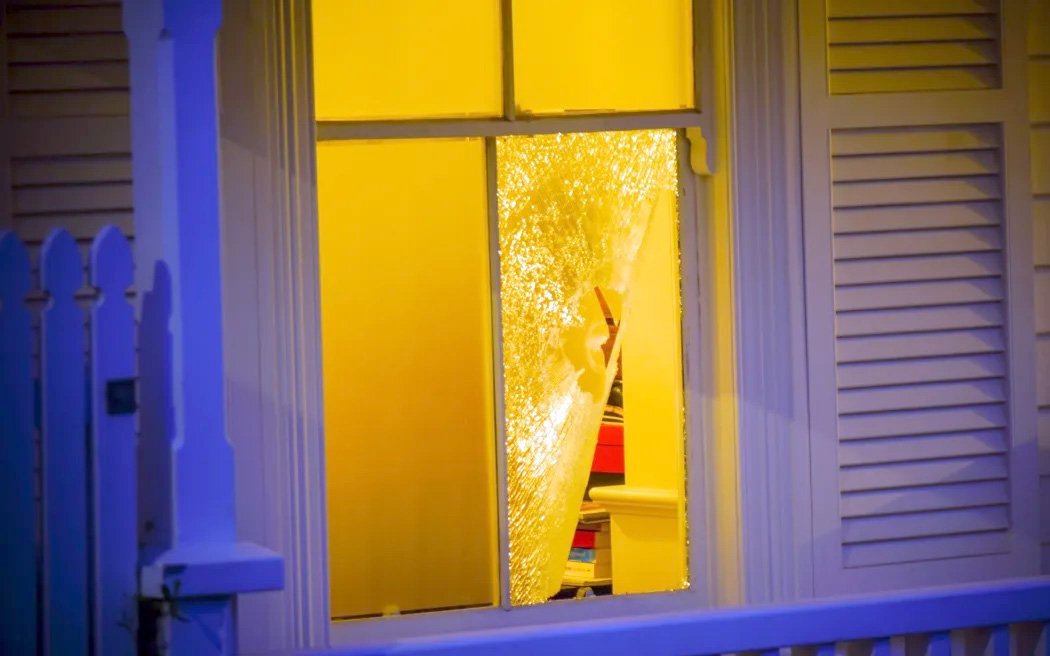
The protesters who turned up outside his house earlier this week crossed a line. Every citizen, be they a minister of the Crown or street sweeper, has the right to return to their home and family in the confident expectation of being left in peace.
There is a public world, where politics takes place; and a private world, where it doesn’t — unless it is invited in.
The pro-Palestine activists who turned up on the minister’s doorstep arrived without an invitation.
And then somebody smashed a window, and another line was crossed.
Banners and chants are one thing, crowbars are another. Broken glass instantly transforms mild exasperation into cold fear. The physical barrier between the world and your world is violently breached.
What had been, just a few moments earlier, your refuge, your place of safety, is no longer secure.
There’s a very good reason why "breaking and entering" was once a hanging offence. Back in the days before professional police forces, people were obliged to transform their dwellings into small fortresses. Every entry point was locked and barred.
To enter a house after dark without the owner’s permission locks, doors, and windows had to be broken.
Visitors to Europe from this comparatively safe part of the world are often surprised by the impressive size and weight of people’s front doors, and by the complexity of their locks.
Policemen in New Zealand will tell you with a wry smile that your front and back door locks are for keeping honest people out. In the United Kingdom and Europe, even dishonest people struggle to get in.
The old saying: "An Englishman’s home is his castle", has more to it than you might think.
Our Parliament is currently considering a Bill to make protesting outside people’s homes illegal.
This measure has been met with considerable public approval. New Zealanders who find it difficult to relate to the endless stream of bad news from places overseas have no difficulty whatsoever in relating to the news of political activists laying siege to people’s houses. A little too close to home, you might say.
Those familiar with the nation’s laws have been quick to point out that the proposed legislation isn’t really necessary. There are already numerous offences itemised in our statute books with which protesters engaged in besieging politicians could be charged.
Indeed, 40 or 50 years ago they would have been charged — and almost certainly convicted — for engaging in such behaviour.
What has happened in the intervening years that sees a sizable number of protesters gather outside a Cabinet minister’s home without being met by a swift and violent police response?
The short answer is that New Zealanders have become a lot more sensitive to the civil and political rights of their fellow citizens.
We have a Bill of Rights Act that guarantees our freedom of speech and our right to assemble peacefully, and the police risk serious legal consequences should they be foolish enough to hoe into protesters with fists, boots and batons.
The long answer is that 40 or 50 years ago any political activist who suggested picketing a Cabinet minister’s home would have been looked at sideways as a probable agent provocateur.
In the 1970s and ’80s the barrier between the public and private spheres was still strong. It was simply understood and accepted that protest was an activity directed at achieving political ends in the public — not the private — sphere.
If you opposed New Zealand’s participation in the Vietnam War you expressed that opposition on the main streets of the country’s major cities, or outside Parliament. You did not express it in front of Keith Holyoake’s prize roses.
Ditto, if you opposed the 1981 Springbok tour. Outside the games (or, more controversially, on the pitch) yes. Outside Rob Muldoon’s Orewa bach, no.
Underpinning those prohibitions was the conviction, shared by New Zealanders who took opposing positions on the big issues, that they were engaging with opponents not enemies. That the "other side" was composed of one’s fellow citizens, not of evil demons from hell.
When people today say: "we have more in common with each other than we do with what divides us", it rings hollow: 50 years ago, it rang true.
Back then we visited each other’s homes, we didn’t picket them.
■ Chris Trotter is an Auckland writer and commentator.














